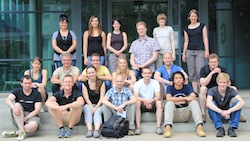Bielfeld University Professor Dr. Olaf Kruse has a class he won’t forget. His biological research team has made what they consider to be a groundbreaking discovery – the green alga Chlamydomonas reinhardtii not only engages in photosynthesis, but is also able to draw energy from other plants. The team believes this could have a major impact on the future of bioenergy. Findings were released in the online journal, Nature Communications.
 According to Kruse, it was believed that only worms, bacteria and fungi could digest vegetable cellulose and use it as a source of carbon for their growth and survival. In contrast, plants engage in photosynthesis of carbon dioxide, water and light. Yet through a series of experiments, Professor Dr. Olaf Kruse and his team cultivated the microscopically small green alga species in a low carbon dioxide environment and observed that when faced with such a shortage, these single-cell plants drew energy from neighboring vegetable cellulose instead.
According to Kruse, it was believed that only worms, bacteria and fungi could digest vegetable cellulose and use it as a source of carbon for their growth and survival. In contrast, plants engage in photosynthesis of carbon dioxide, water and light. Yet through a series of experiments, Professor Dr. Olaf Kruse and his team cultivated the microscopically small green alga species in a low carbon dioxide environment and observed that when faced with such a shortage, these single-cell plants drew energy from neighboring vegetable cellulose instead.
So how does this work? Kruse explains that the alga secretes enzymes (so-called cellulose enzymes) that ‘digest’ the cellulose, breaking it down into smaller sugar components. These are then transported into the cells and transformed into a source of energy and abracadabra – the alga can continue to grow.
“This is the first time that such a behaviour has been confirmed in a vegetable organism,” noted Professor Kruse. ‘That algae can digest cellulose contradicts every previous textbook. To a certain extent, what we are seeing is plants eating plants.”
So does this trick happen with also forms of alga? Kruse says preliminary findings indicate this is in fact the case. And based on this hypothesis, this unique property of algae, the presence of celulose enzymes could be of interest for bioenergy production. There would no longer be a need for organic materials to feed the fungi that are currently used to extract the enzymes needed to break down the cellulose.

